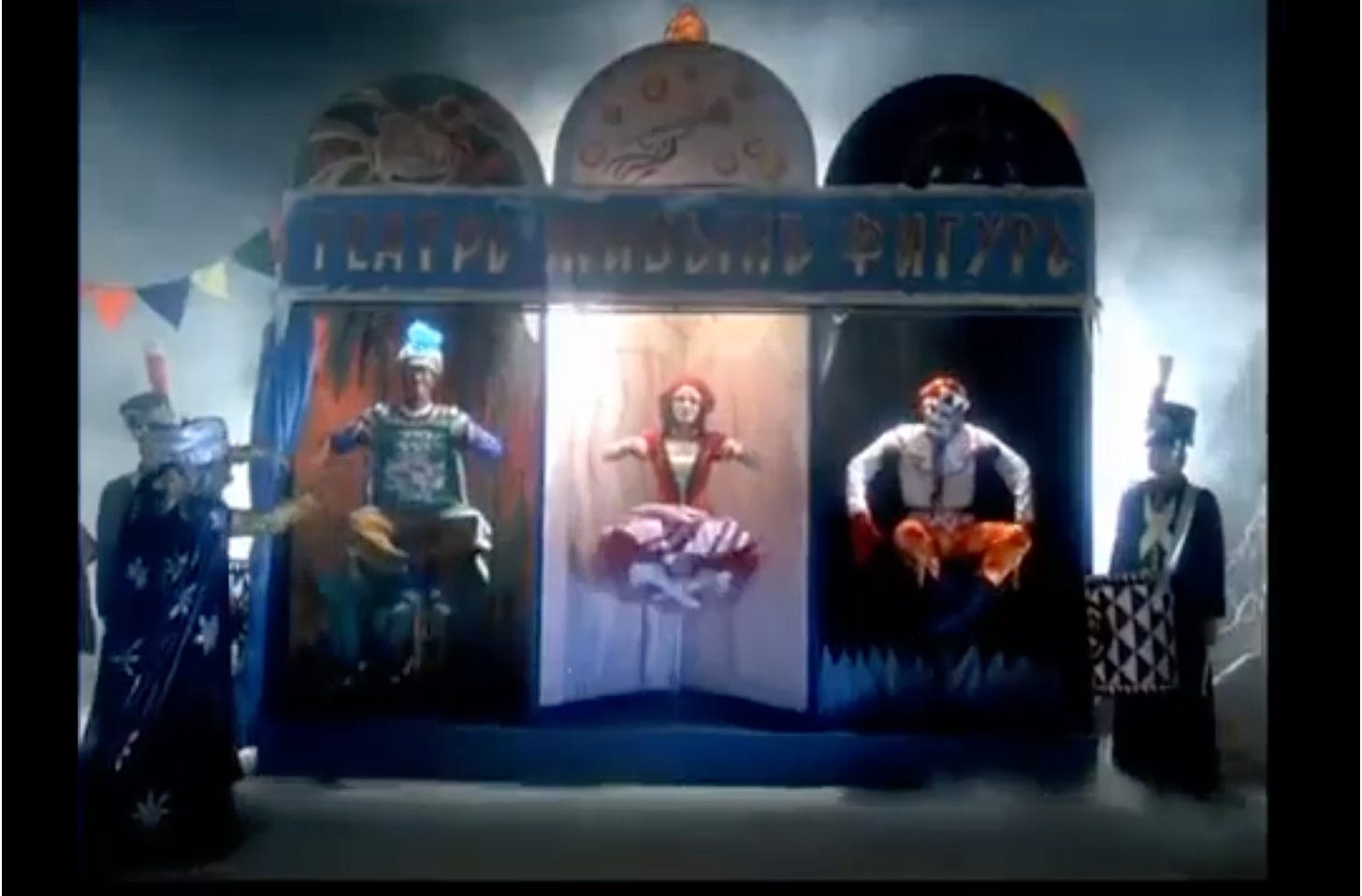Petrushka [BOLSHOI BALLET]
(SCREENCAP)
Igor Stravinsky first wrote the music for Petrushka (1911) as a concert piece, but on hearing it, impresario Serge Diaghilev conceived of creating a whole ballet from the work.
The video below features two Stravinsky ballets as performed by the Bolshoi Ballet. The excellent DVD was released in the US in the early 2000s, and will surely hold up well with future generations. These colorful, dynamic and lavish productions were made in the 1990s at the Mosfilm Studios.
The skill and artistry displayed by dancer (and director) Andris Liepa (a.k.a. “the Perestroika kid”) astonishes me no end. He plays the archetypical Russian puppet, Petrushka. (Fun fact: Petrushka the puppet is also known as “Punch” in England and “Pulcinelle” in France, etc..)
Liepa’s dance work is especially highlighted in the second scene: with flailing arms and disjointed movements, he depicts a marionette who seems unable to control his limbs.
Liepa reconstructed the classic choreography of Michel Fokine through documents and written recollections (as mentioned in the Telegraph article linked above, “the Perestroika kid”).
SETTING:
The time is the 1830s, and the scene is the marketplace at the Shrovetide Fair (a.k.a. Maslenitsa, just preceding Lent).
Video below is set to begin playing when Petrushka comes to life via the Magician’s wand, together with the two other puppets, the Ballerina and the Moor.
(SCREENCAP)
In the next scene, we enter Petrushka’s room backstage, with its stark, fantastical design that includes a reflecting floor.
(SCREENCAP)
Petrushka possesses human emotions of love and longing (for the Ballerina, who ignores him and prefers the Moor), and anger (at the Magician for creating him). When the Ballerina comes into the puppet’s room, Petrushka clumsily expresses his joy at her appearance, but she is frightened and soon gone from the room.
(Full synopsis of the ballet is posted below the video.)
ENJOY!
Stravinksy- Petrushka & Firebird, Andris Liepa, Bolshoi Film
Choreography by Michel Fokine.
Music by Igor Stravinsky.
Petrushka Synopsis
Petrushka: Maslenitsa (Orthodox Carnival) in St. Petersburg. The Curtains of a booth are drawn back to reveal three puppets: a moor, a Ballerina, and Petrushka. The Ballerina dances with both puppets and Petrushka, who is in love with her, in his jealousy beat the Moor with a club.
The Scene changes to Petrushka’s cell-like room. The Magician pushes Petrushka through the door. Petrushka weeps- The Magician is cruel to him and his beloved Ballerina is infatuated with the Moor. Suddenly the Ballerina appears, and Petushka in delight. Unable to comprehend his joy, the Ballerina retreats in fear. Petrushka is again left alone. He tries to escape but fails.
The Scene changes to the Moor’s room, with exotic drawings on the walls. The Moor lies on the sofa, playing indolently with a large coconut. When the door opens and the Ballerina appears, he is initially indifferent to her, but her coquettish advances arouse his interest and he tries to embrace her. Suddenly the door is thrown open and Petrushka rushes in a rage. He circles the room until the Moor pushes him out. The Ballerina is delighted at the Moor’s prowess and throws herself into his arms.
The Scene reverts back to the Carnival. It’s getting dark and the dancing and merriment cease. The Curtain of the Magician’s booth moves as though someone were trying to get out. Finally, the frightened Petrushka with the Moor chasing him. The Moor kills Petrushka, but the Magician appears and explains to the appalled crowd that what they have witnessed was the death of a puppet, nothing more. He shows them Petrushka’s body, filled with sawdust. The crowd disperse leaving the Magician alone. A sudden scream breaks the silence. A resurrected Petrushka appears in the moonlight on the roof of the booth and shakes his fist at his tormentors.
NOTE:
This video also includes The Firebird, starting at 34:54. That synopsis can be read at the YouTube video posting. With his shock of silver hair, Andris reminds me of the late Russian baritone, Dmitri Hvorostovsky.




